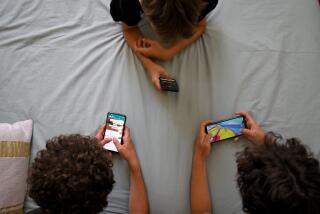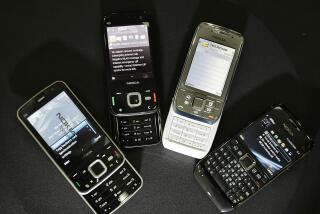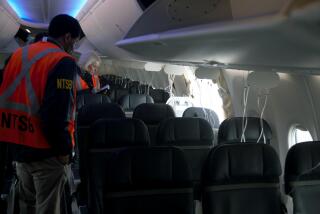Daum: Electronically, up in the air and at loose ends
In the scheme of mythical hazards — that you should never swim immediately after eating, that touching a frog will give you warts, that you’ll grow hair on your hands if you, well, you know — the idea that an iPod could bring down a plane has been singled out for particular scorn. For years, airline passengers have been stomping their feet like angry children: It’s not true! The government is saying that to control us. It’s a conspiracy on the part of SkyMall to tempt us into buying lawn statues.
Now comes news that the Federal Aviation Administration is likely to ease restrictions on personal electronic devices. We won’t know all the details until September, but it’s expected that using gadgets like MP3 players and electronic readers will no longer be prohibited during takeoffs and landings. Cellphone calls and Internet transmissions will almost certainly remain off-limits, but it’s possible that laptop computers will be allowed under 10,000 feet.
For my part, if I’m working while flying, I’m often a bit relieved to be forced to shut down the computer on final descent. But I guess I’m a slacker. I recently heard a public radio station program on this subject wherein a listener called in and insisted that not being able to use a laptop or iPad during takeoff and landing “literally” cost him “hundreds of hours of work time each year.”
Hundreds of hours of work time, or hundreds of hours of Angry Birds? OK, that particular frequent flier may be extra diligent and have a gargantuan workload (though, curiously, he had time to call in to a radio show), but I honestly can’t remember the last time I walked down an airplane aisle and saw fewer than 90% of electronic device users doing anything other than playing games or watching movies.
Sure, there’s always that guy with the Excel spreadsheet. But, generally speaking, our habits aren’t that much different in the air than they are on the ground. We use our gadgets for distraction and entertainment. We use them to avoid work while giving the impression that we’re actually working hard. Moreover, if left no choice but to work with an old-fashioned pen and paper, we throw up our hands, telling ourselves that we can’t possibly be productive unless there’s a glowing screen and blinking cursor in the mix.
Gripes about the social costs of being plugged in around the clock are well enough trodden by now that they’re practically cliches. We hear all the time how smartphones have turned us into attention deficient zombies. We know the threats they pose on the roads and even the sidewalks, where walking while texting can result in any number of embarrassing if not physically injurious mishaps. We agree (well, some of us do) that a small piece of humanity is lost when, amid an argument with friends over whether “Deliverance” starred Jon Voight or Christopher Walken, someone whips out his phone and looks up the answer on IMDB.
But the discussion of whether we should be able to use these things on planes underscores yet another, less lamented but possibly more pernicious symptom of a culture that’s nearly incapable of hitting the off button: the false sense of importance these devices give us. When you think about it, there’s something pretty hubristic about carrying devices in our purses or pockets on which we can be reached any time, anyplace by voice or text. Checking email every 45 seconds is not only compulsive, it’s presumptuous. It suggests a belief that anyone who sends us a message needs us to read it immediately, even if the message is from SkyMall telling us our Bigfoot Garden Yeti statue has shipped.
Air travelers, of course, are famous for their hubris. They carry on too many bags and use the restroom when the seat-belt sign is on. Why wouldn’t they feel entitled to gate-to-gate laptop privileges?
Barring any compelling evidence that these privileges pose real safety risks, it seems reasonable that the FAA should stop pretending that Microsoft Word can interfere with air traffic control and go ahead and grant them. But in turn, passengers might want to stop pretending that they’re conquering the business world when in fact they’re playing World of Warcraft.
They also might want to consider grabbing a certain little gizmo called a paperback book. The battery life is amazing.
More to Read
A cure for the common opinion
Get thought-provoking perspectives with our weekly newsletter.
You may occasionally receive promotional content from the Los Angeles Times.







